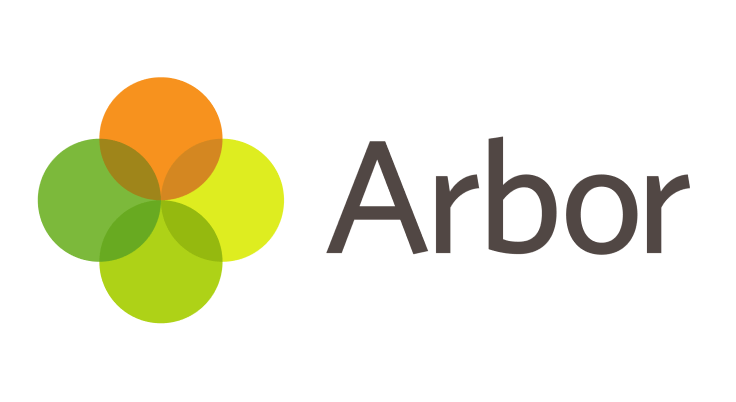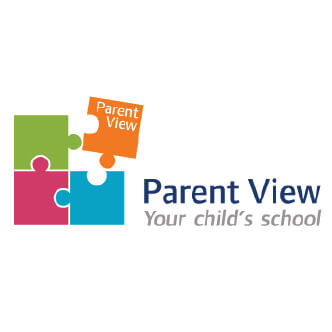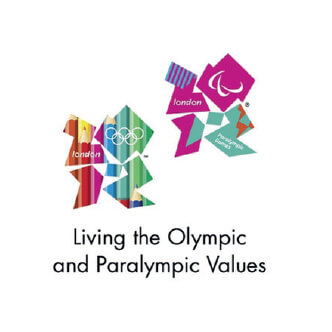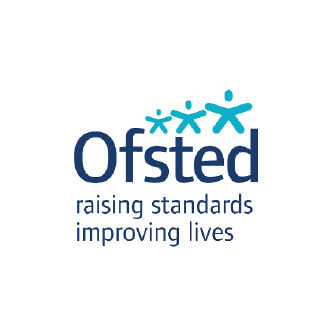Special Needs Provision
Our Inclusion Coordinator (INCO) & Autism Lead is Dani Roe.
Our SEN Information Report forms part of the Hertfordshire Local Offer for Learners with Special Educational Needs and/ or Disabilities (SEND).
Our SEN information report has been produced with parents, carers, governors and members of staff.
We hope that the following 15 questions and answers help you understand what Greenway school offers for children with Special Educational Needs. (This report is reviewed annually and the next review date is September 2023)
1. How does the school know if children/young people need extra help?
Children are identified as having special educational needs/disability (SEND) through a variety of ways including the following:
- Child performing significantly below age expected levels.
- Concerns raised by parent.
- Concerns raised by teacher, for example behaviour or self-esteem is affecting performance.
- Consultations between class teachers and members of the leadership team where progress data is discussed e.g. pupil progress meetings.
- Liaison with external agencies e.g. Educational Psychology Service.
- Health diagnosis through a paediatrician.
- Liaison with previous school or setting, if applicable.
- We follow The Graduated Approach, A Four Part Cycle
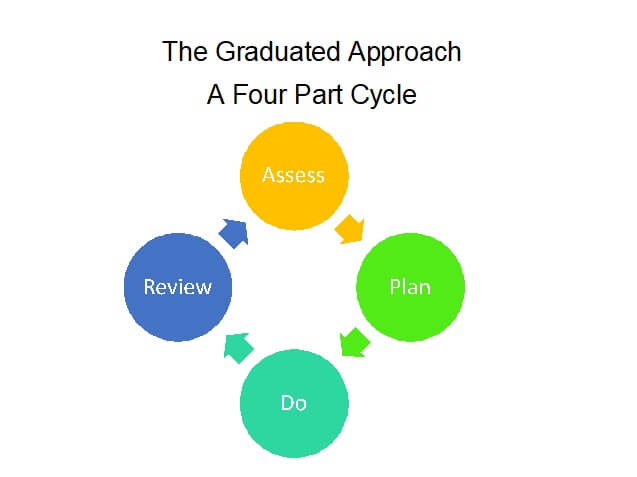

Where a pupil’s progress is significantly slower than that of their peers, or fails to match their previous rate of progress, despite high quality teaching targeted at specific areas of difficulty, it may be that a child has SEND.
2. What does the SEN Code of Practice say?
At different times in their school life a child may have a special educational need
The Code of Practice 2015 defines SEN as follows:
“A child or young person has SEN if they have a learning difficulty or disability which calls for special educational provision to be made for him or her.”
A child of compulsory school age or a young person has a learning difficulty or disability if he or she:
- has a significantly greater difficulty in learning than the majority of others of the same age, or
- has a disability which prevents or hinders him or her from making use of facilities of a kind generally provided for others of the same age in mainstream schools or mainstream post-16 institutions.
3. What should I do if I think my child may have special educational needs and/or disability?
If you have concerns regarding your child’s progress or well-being then please speak to your child’s class teacher and/or
- Inclusion Coordinator-INCO-Dani Roe
- Head teacher-Katharine Ellwood

4. How will school staff support my child?
- If a learner is identified as having SEND, we will provide support that is ‘additional to’ or ‘different from’ the differentiated high quality approaches and learning arrangements normally provided.
- We may provide personalised learning to help overcome their barrier to learning.
- Some learners may require Interventions which target the area of difficulty (This does not necessarily mean your child has SEND).
- Interventions are planned and matched to the needs of the individual learner. They are reviewed regularly and the impact monitored.
- Interventions may be taught as a small group, or individual basis by a teacher or teaching assistant.
- Some children may require individual adult support for some or all of the school day.
- Some children may require specialised equipment or ICT to support their learning.

5. How will I know how my child is doing?
We will discuss your child’s progress with you at review meetings
- Interventions and support will be closely monitored by class teachers and INCO and the impact shared with parents and pupils regularly.
- Meetings with teachers and teaching assistants will inform progress.
- Progress will be discussed at half termly pupil progress meetings with Senior Leadership Team (SLT). Any adjustments and changes to provision will be shared with parents by class teacher and/or INCO.

6. How will the learning and development provision be matched to my child’s needs?
We use a four stage graduated process: Assess, Plan, Do and Review which is embedded in high quality first teaching
Assess: the pupils needs taking in all information from parent, class teachers and assessments
Plan: identifies the barriers to learning and plans the learning
Do: provide the support
Review: Measure the impact of the support and consider whether changes need to be made. All involved contribute-the learner (using pupil voice), parents/carers, teacher, INCO and decide on the next steps.

7. What support will there be for my child’s overall wellbeing?
We have a caring, understanding ethos and are an inclusive school; we welcome and celebrate diversity, and believe that high self-esteem is crucial to children’s well-being.
“The child is at the centre of everything we do”
- As a nurturing school, all our vulnerable pupils are well known to the school staff, one page profiles are used to share information.
- Children are encouraged to seek adult support should they be feeling worried or upset. Some have a specific key adult who has been selected through discussions with pupil and staff.
- PSHE-Personal, Social, Health Education lessons are taught each week in class supported by assemblies.
- Counselling is a provision available for some children and is available in school with an independent specialist which is regularly monitored and reviewed with parents, child and staff.
- Some children may be invited to take part in Social skills/friendship groups to meet specific needs.
- Some children are able to attend clubs at lunchtime and/or eat their lunch in a different environment, allowing them a calm space.
- Drawing and Talking Therapy is available for some children.

8. What specialist services and expertise are available at, or accessed by, the school?
For some children it will be necessary to seek the advice and support from specialist services.
Here are some of our partners:
- ADD-vance – coaching for parents and schools for children with ADHD/ASD.
- Child and Adolescent Mental Health services (CAMHS).
- Child and Family Paediatricians.
- Childrens Centres.
- Communications and Autism team.
- Dacorum Education Support Centre (DESC).
- Educational Psychologist.
- Health visitors.
- Hearing Impairment Team.
- Low Incidence Visual Impairment Team.
- Occupational Therapists.
- Social Communications difficulties Team.
- Specific Learning Difficulties Base (SPLD).
- Speech and Language Therapists.

9. What training have the staff, supporting children and young people with SEND, had or are having?
All our learning spaces provide a fully inclusive environment which supports the needs of all children.
- ADD-vance Training.
- Therapeutic Approach to Supporting Behaviour training.
- Elklan- Speech and Language.
- INSETs to brief on SEND Code of Practice and SEN reforms 2014.
- First Aid and specific medical training.
- Some staff have attended specific training on Sensory awareness programme, Hearing Impairment, Visual Impairment, Makaton.
- Philosophy For Children (P4C) training.
- Staff are trained in AET (Autism Education Trust) Tier 1.
- Mental Health Level 1 training.
- Attachment and Trauma training.
- Drawing and Talking therapy.
- Protective Behaviours training.
10. How will you help me to support my child’s learning?
- Parent/curriculum workshops.
- Learning packs sent home with support on how to use them.
- Regular review meetings.
- Welcome to new class meetings.
- Policies on website.
- Child’s annual school report.

11. How will I be involved in discussions about and planning for my child’s education?
When a child is identified has having SEND the class teacher/INCO will keep you up to date in some/all of the following ways:
- Parent/Professional meetings.
- Class teacher meetings.
- Good news/communication books.
- Emails/telephone conversations.
- One page Profile
12. How accessible is the school environment?
Our school environment is regularly reviewed to ensure all children have safe accessibility and it fully supports their needs.
- There are 2 toilets for disabled pupils with wheelchair access and 1 staff toilet.
- Intimate care policy in place.
- Individual care plans discussed and reviewed with child and parents.
- Areas can be adapted and modified to meet the needs of individual pupils and their SEND.

13. How will the school prepare and support my child join the school, transfer to a new school or the next stage of education?
Strong partnerships are in place when a child moves between settings eg Nursery to Reception, starting secondary school and or moving school.
Support could include:
- Visit to pre-school.
- Visit to day nursery.
- Visit with child minder or at home.
- Visits to secondary school or new school.
- New to Nursery and New to Reception meetings before child starts.
- Planning and discussions with school staff/child/parents.
- Planned visits to new school with INCO/key adult.
- Detailed discussions between INCO/staff and receiving school.

14. How is the decision made about how much support my child will receive?
This is decided by class teachers in consultation with INCO/SLT and reviewed regularly with parents and child. Every child is individual and support will be put in place to scaffold and extend their learning depending on their individual needs. Some children may need short term intervention or longer learning support.
This may include:
- Individual or group interventions.
- Individual adult to support learning in classroom.
- Some children have High Needs Funding (HNF) which can provide resources, specialist equipment and/or teaching assistant support.
- Some children with SEN may receive Pupil Premium Grant which is used to enrich and support their learning/emotional needs.
- Some families will be supported by a Families First Assessment (FFA) and subsequent Team Around Family (TAF) review meetings.
- Some children may have outcomes as part of an Education Health and Care Plan (EHCP).
15. How can I find information about the Local Authority’s Local Offer of Services and Provision for children and young people with SEND?
Please visit the Hertfordshire Directory’s Local Offer page.

Please click here to view the Hertfordshire/Greenway Information Report.
Please click here to view Greenway’s SEND Policy
Hertfordshire High Quality SEND Local Offer
Support for Autism and ADHD in Hertfordshire – October 2022
Hertfordshire SEND 5 Year Strategy, April 2018 – March 2023
Hertfordshire Speech Language & Communication Needs Quality Offer – April 2019
Hertfordshire Autism Quality Offer – Dec 2018
Ambitious About Autism (a registered charity) – Parent Toolkit
Coronavirus information relating to SEND:
- to view Hertfordshire’s SEND local offer including Coronavirus updates click here
- to view ‘Distance education resources for children and young people with SEND’ click here
- to view information re SENDIASS (an impartial Special Educational Needs and Disability Information, Advice and Support Service) click here
- to view more resources for autistic people and families click here

